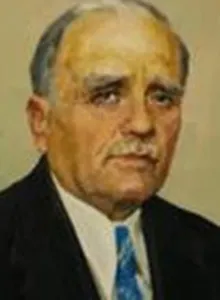
Rodion Skaletskyi (23 November 1899, Mykhailivka - 22 March 1984) was a Ukrainian composer, a follower of Mykola Leontovych, author of about 100 original works, and a choral conductor.
He studied at the Odesa Institute of Public Education, where he organised a student choir. Later he worked as a teacher of history, language and literature and singing in labour schools, vocational schools, technical schools, and vocational schools and directed choirs.
In 1924, he married N. F. Kilchevska, and in 1926, his daughter Natalia was born.
In Tulchyn, for 7 years, he led the district singing chapel named after M. Leontovych. Here he compiled the first collection of recorded and arranged folk songs, and wrote several of his own compositions.
In 1933, he was repressed.
Even the SBU officers were involved in the rehabilitation of the composer, a former KGB prisoner. They undertook to find out the circumstances of Leontovych's murder, which had been suppressed for decades, and to tell about the fate of Skaletskyi, a former prisoner of KGB No. 13. In 1932, the State Security Committee discovered the source of the same danger in the circle of peaceful Tulchyn teachers. The central figure was Rodion Skaletskyi, a follower of the already murdered Leontovych:
"A group of teachers, united by a common counter-revolutionary ideology and hostile attitude towards the Soviet government and its measures, and most of them having a counter-revolutionary past and connections, took command positions in Tulchyn secondary schools and in the public education inspectorate with the assistance of each other. They persistently surrounded themselves with a counter-revolutionary element: former officers, Petliurists, clergy and other former people, also employing them in schools and thus preserving counter-revolutionary cadres in the Soviet apparatus .... The accused Skaletskyi Rodion Andriyovych pleaded not guilty to belonging to a counter-revolutionary organisation and stated that he had only participated in anti-Soviet conversations and criticism of the Soviet authorities. Nevertheless, the investigation established that Skaletskyi, being chauvinistic, was pushing his idea through the Leontovych Chapel, which he led and was organised mainly from a socially alien element."
To the credit of Skaletskyi's friends, none of them became slanderers, but they paid for it with their freedom - all of them were sent to camps. Hryhoriy Sakovych, a teacher at Tulchyn school who was sentenced to 8 years in concentration camps, gave the following testimony in the Skaletsky case:
"In general, I must say that Skaletsky was on good terms with all his acquaintances, of whom he had a lot, he liked to talk. Especially with women on "empty" topics."
Hryhoriy's fate is unknown. Fedir Lebid, headmaster of Tulchyn school, was sentenced to 3 years in Siberian concentration camps:
"Skaletskyi was very fond of talking about music and the situation of the chapel. He often invited me to listen to a new piece he had composed and give it an assessment. Skaletskyi was most sympathetic to Leontovych, and he associated his musical career with his school."
There is no compromising evidence in the testimonies of the other five people involved in the case. Rodion Skaletskyi was exiled to the town of Valuiki in the Kursk region for three years. In his memoirs, the composer wrote:
"To be administratively exiled from the territory of the Ukrainian SSR means to be socially dangerous. This measure is absolutely undeserved for me..."
Trying to win the favour of the Soviet authorities, he wrote cheerfully patriotic descriptions:
"Along with my conducting work, I have written and am now writing many revolutionary songs, some of which have already been published and some are ready. Such as, for example, "Battle Song" - dedicated to the 15th anniversary of the Red Army, "Budapest March".
His repertoire even included the March of the GPU, dedicated to the decade of the creation of this organisation.
It was only in 1946 that he started working in schools in Vinnytsia region again.
He composed music to texts by M. Rylsky, P. Tychyna, V. Sosiura, M. Koznanska, and I. Nehoda. The repertoire of R.A. Skaletskyi's choirs consisted of more than 80 works, including his own.
In 1955, he was awarded a diploma at a conference in Moscow, where he gave a presentation on music education.
Upon returning to his homeland, Skaletskyi returned to teaching. From 1964 to 1969, he worked as a methodologist at the music room of the Vinnytsia Institute for Advanced Training of Teachers, and as the executive secretary of the regional branch of the musical choral society.
During these years, he worked on and compiled several collections: "Periwinkle Seedlings", "Wedding", "Spring Circle", edited two collections of folk songs, composed several choral works to texts by Soviet poets and classics of Ukrainian literature, wrote a song about his native village Mykhailivka to a text by his countryman I. Palahniuk, and music to the texts of rituals: "Wedding in Podillia", "Generous Evening", "Meeting of Spring".
In the regional House of Folk Art, he headed the choral society, and in 1970 he organised the choir of veterans of the Great Patriotic War, was its director and chief conductor.
He retired in 1970.
He died on 24 March 1984.
He was buried at the Forest Cemetery in Kyiv next to his wife Nadiia Fedorivna.
His creative heritage includes 598 works, of which 373 are published and 225 are in manuscripts. The composer wrote about 100 original works and arranged many folk songs.
Commemorations
A street in Vinnytsia is named after the composer.
Part of his cultural heritage is kept in the district museum of local lore.
Since 1990, the Skaletskyi Museum has been operating in Mykhailivka, where the composer's personal belongings, works, and a piano are kept.
Since 2009, the Bershad Children's Music School has been named after the composer.
On 22 November 2011, a bust of the composer was installed on the territory of the district museum of local lore and the Bershad Children's Music School.

